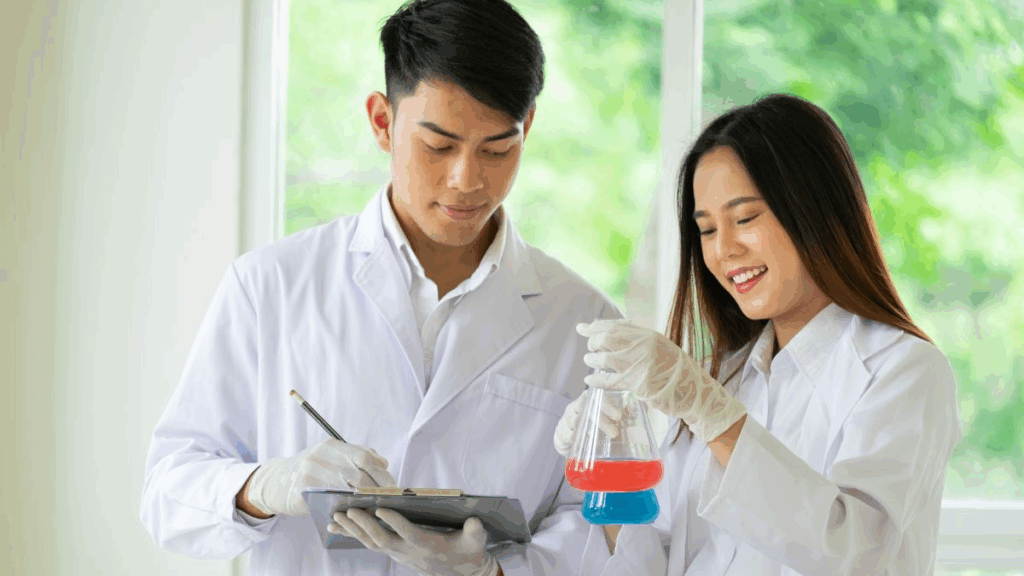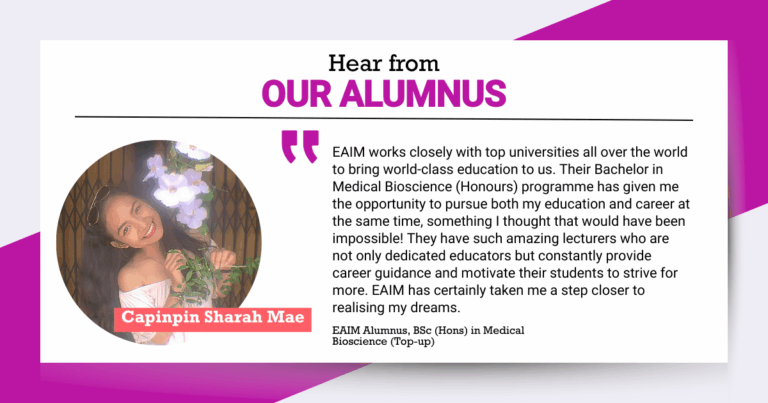
Singapore’s biomedical sector has become a global benchmark for innovation, offering biomedical graduates a wealth of opportunities. With sustained growth, competitive salaries, and strong government investment, the industry provides a dynamic environment for professionals to thrive.
The biomedical sector has maintained an impressive 10% compound annual growth rate since 2020. Demand is especially strong for specialists in clinical genetics, cancer biology, and clinical microbiology, with startups in these fields attracting over S$500 million in venture funding since 2022 (BioSingapore, 2023 Industry Survey). Looking ahead, Singapore’s S$80 million investment in cell and gene therapy manufacturing (EDB, 2023) and over S$1 billion committed to biomedical R&D under the Research, Innovation and Enterprise 2025 plan signal continued growth and demand for skilled professionals.
To meet industry needs, programmes like the BSc (Hons) in Medical Bioscience (Top-up) awarded by Aston University (offered through EAIM) provide targeted training in high-demand areas. The curriculum includes hands-on modules such as immunology and inflammation, molecular pathology, clinical genetics and human disease, and a capstone research project in biosciences, ensuring graduates are well-prepared for careers in Singapore’s S$22.4 billion biomedical industry (Singapore Economic Development Board, 2023 Annual Report). For working professionals, the programme offers a flexible pathway to upgrade qualifications while gaining practical experience, keeping pace with industry trends such as advanced therapeutics and infectious disease research.
The biomedical sector offers structured career progression, with many professionals starting as research associates in A*STAR institutes or hospital laboratories before advancing to leadership roles within 4–5 years. Emerging fields like green biotech, infectious disease detection, and cancer screening technologies are opening new career pathways—areas covered in EAIM’s forward-looking bioscience programmes. Public healthcare institutions also provide strong career opportunities, with workforce initiatives enhancing compensation and professional development. Institutions like EAIM play a crucial role in preparing graduates for rewarding careers at the forefront of medical innovation.
Furthermore, salaries in the biomedical sector remain highly competitive, reflecting the demand for specialised skills. Entry-level medical technologists in hospital laboratories now earn between S$3,200 and S$3,800 monthly—a 7–9% increase from 2021 levels (Ministry of Health, 2023 Workforce Report). Professionals with specialised training command a 15–20% salary premium, with mid-career scientists (5–7 years of experience) earning S$5,500–S$7,200 monthly, while principal investigators in senior roles can exceed S$10,000 (Ministry of Manpower, 2023 Occupational Wage Survey). Recent public sector salary adjustments further strengthen the job market. As the Ministry of Health stated, “With these salary increases, which are over and above the annual increments, we will enable the public healthcare sector to better attract and retain staff” (March 27 statement).
The biomedical sector is evolving rapidly, with key trends shaping future opportunities. Singapore’s investments in cell and gene therapy, along with growing demand for infectious disease and cancer screening technologies, are driving demand for specialists in these fields. Additionally, emerging areas like green biotech present new avenues for growth. With strong government backing and a thriving innovation ecosystem, Singapore’s biomedical sector is poised for long-term expansion. Programmes like those offered by EAIM ensure graduates are equipped with the skills needed to excel in this dynamic industry.

Sources:
- Singapore Economic Development Board. (2023). Biomedical Sciences Industry Report [https://www.moh.gov.sg/docs/librariesprovider5/resources-statistics/reports/moh-edb-biomedical-report-2023.pdf]
- Ministry of Health. (2023). Healthcare Workforce Development Plan [https://www.moh.gov.sg/news-highlights/details/revised-salaries-for-healthcare-professionals]
- BioSingapore. (2023). Annual Industry Survey and Outlook [https://www.biosingapore.sg/industry-statistics]
- Agency for Science, Technology and Research. (2023). RIE2025 Biomedical Sciences Initiatives [https://www.a-star.edu.sg/RIE2025]
- The Straits Times. (2025). 63,000 public healthcare staff to get salary jumps of up to 7% [https://www.straitstimes.com/singapore/63000-public-healthcare-staff-to-get-salary-jumps-of-up-to-7-per-cent?utm_medium=social&utm_source=linkedin&utm_campaign=stli]
